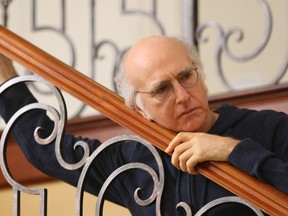A major finding from the study revealed that there was a lack of diversity when it came to Jewish characters on screen

Rising antisemitism in the United States has spurred a deep-dive into the portrayal of Jews on television through a study, which warns against using tropes associating Jews with money and power, among its six recommendations.
Recommended Videos
The study observed how Jewish characters were portrayed in series such as Curb Your Enthusiasm, And Just Like That…, Law & Order: Special Victims Unit and The Marvelous Mrs. Maisel. Another part of the study focused on the representation of Orthodox Judaism.

“The rising tide of antisemitism underscores the importance of nuanced and humanizing portrayals of Jewish Americans in entertainment,” wrote the study’s authors. “Previous research has noted a lack of visible signifiers of Jewish religion or culture, alongside centuries-old tropes like the ‘Greedy Shylock’ and control over powerful institutions in government, finance, and media.”
A major finding from the study revealed that there was a lack of diversity when it came to Jewish characters on screen.
Researchers watched 49 episodes of television and observed 108 Jewish characters from 15 different shows that aired between 2021 and 2022. The shows were chosen because they had the most mentions of 30 keywords chosen by researchers that related to Judaism.
The vast majority (95 per cent) of the Jewish characters were white, while three were Black, one was Asian and one was Middle Eastern. Jews with any other intersecting identity, like Jews from the LGBTQ+ community or Jews who were plus-size, were “largely absent.”
Meanwhile, 30 per cent of Jews on screen were shown to be wealthy. Half of those characters held “elite or powerful jobs, including jobs in media or entertainment.”
“There are centuries-old tropes portraying Jews as powerful, cunning, or greedy, which trace their origins back to before Shakespeare,” per the study.

Despite a character’s Jewish identity, less than one in five referenced Judaism in dialogue.
The study also noted that portrayals of Orthodox Jews in television were limited and often showed the Orthodox community as “isolated, criminal, or patriarchal.”
For this part of the study, researchers observed 30 episodes of scripted television. One third of the episodes had no current or formerly Orthodox characters but used “passing linguistic references, indicating that the Orthodox community is spoken about rather than spoken with.”
Half of the episodes “had characters expressing negative judgments of Orthodox Judaism or positioned Orthodox culture as othered,” the study said.
The study shed light on stereotypes and tropes that “emboldened antisemitism” and called for more nuanced representation.
Its recommendations included elevating Jewish characters whose stories remain untold, giving voice to Jewish pride and joy, leaning into diversity, allowing Orthodox characters to speak for themselves, and depicting Orthodox Jews as “people next door.”
The study said the events of Oct. 7, 2023 — when Hamas terrorists attacked Israeli citizens, killing 1,200 people and triggering a war in Gaza — sparked the rise of antisemitism in the United States. The study’s authors endeavoured to uncover how Jews in television were portrayed because such characters impact popular culture and opinions, including attitudes toward Judaism.
Our website is the place for the latest breaking news, exclusive scoops, longreads and provocative commentary. Please bookmark nationalpost.com and sign up for our newsletters here.